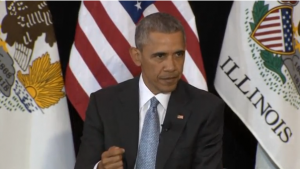
CHICAGO, ILLINOIS, United States (Reuters) – President Barack Obama returned on Thursday (April 7) to the University of Chicago Law School where he once taught to make the case for his U.S. Supreme Court nominee as Senate Republicans harden their opposition to confirming Merrick Garland to the post.
Obama said the refusal of Senate Republicans to approve Garland risked destroying the “institutional integrity of the judicial branch.”
“If you start getting into a situation in which the process of appointing judges is so broken, so partisan that an imminently qualified jurist cannot even get a hearing, then we are going to see the kinds of sharp partisan polarization that have come to characterize our electoral politics seeping entirely into the judicial system and the courts will be just an extension of our legislators and our elections and our politics and that erodes the institutional integrity of the judicial branch,” Obama told a crowd of students and faculty.
Senate Majority Leader Mitch McConnell has insisted the next president, who will take office on January 20 after the November 8 election, should fill the vacancy created by the February 13 death of conservative Justice Antonin Scalia.
Democrats call McConnell’s move to block the nomination historic and unprecedented, saying that the Senate Judiciary Committee, since it started holding confirmation hearings a century ago, has never before denied such hearings to any president’s Supreme Court selection.
The high court is now split 4-4 between conservatives and liberals. Garland, if confirmed, could tilt the court to the left for the first time in decades.
Most Republican senators have backed McConnell’s stance. Only two of the 54 Republicans in the 100-seat Senate have said Garland deserves hearings and a vote.
Some others have said they will meet with Garland privately for a “courtesy visit.” That includes Judiciary Committee Chairman Chuck Grassley, who is set to have breakfast with Garland next Tuesday, but only to explain why he will not consider his nomination.
The White House wants to take the debate out of Washington. Opinion polls show a majority of Americans believe the Senate should vote on the nomination.
Obama taught constitutional law at the University of Chicago for more than a decade before he entered politics. The town hall will include judges from the 7th U.S. Circuit Court of Appeals and other local judges, the White House said.







